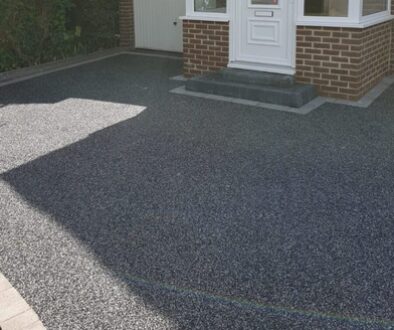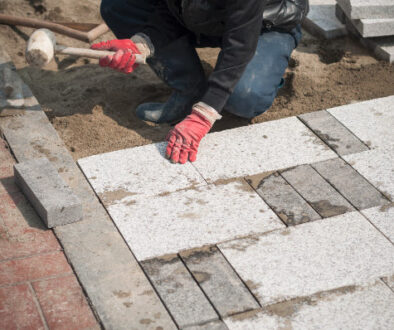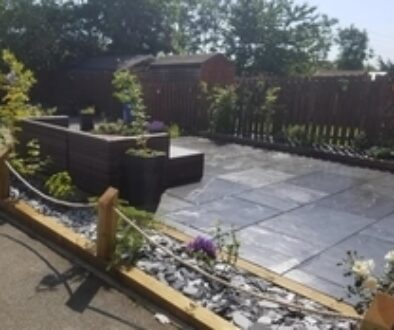What is the best type of driveway in Newcastle?
Naturally, when considering different materials to use for your driveway, the UK weather plays a big factor. Luckily, the main materials that are suitable for the British climate are commonly available and can be found at reasonable prices. There are many options to choose from with their own list of pros and cons so here is a list of such materials.
Types of driveway surfaces
Listed below are the most popular choices that many people consider:
Gravel
Being the cheapest of surface options, a gravel driveway is built up of small stones/ pebbles which are flattened into a hard-wearing foundation. An added benefit is that the sound that it makes alerts you to any unwanted visitors approaching your property. However, it does not last as long as other surfaces and is prone to weeds making it more arduous to preserve.
Concrete
This is the simplest type of driveway that our customers consider. Once the driveway foundations have been laid out, a mixture of concrete is poured over the surface to create a long-lasting hard-wearing driveway. Although lacking in looks, this material has high endurance, relatively cheap and lasts many years.
Tarmac
Tarmac (also known as ‘asphalt’) is the same surface used for many roads and pavements across the UK therefore well accommodated to typical British weather. It is a popular option due to the 20-year endurance and low prices. Despite this, during very hot weather, tarmac can get very sticky and become deformed and isn’t the most pleasant looking of surfaces.

Call for friendly advise on the best material 0191 666 0350 –
Driveway Newcastle
Imprinted concrete
Imprinted concrete will last just as long as ordinary concrete yet is a little more attractive. A mixture of concrete is still poured out onto a foundation, but colours can be added as well as imprinted patterns. This has all the benefits of concrete but also gives the illusion of a stone driveway. However, imprinted concrete does need yearly maintenance which can be difficult to carry out without affecting the look of the driveway.
Resin
Resin driveways have become popular amongst many homeowners. It also has high durability and is fairly attractive. There are two types of resin: bounded and bonded. Bonded is a layer of aggregates which is scattered simply over the top of the resin. However, over time it can become loose, making it the cheaper of two. Bounded is resin and aggregates mixed together before they are laid out creating a more penetrable and durable surface. Bounded is more expensive, yet the better choice of the two.
Crazy paving
Crazy paving was popular in past decades, but is now making a comeback. This is partly due to the movement towards a more sustainable and environmentally friendly future. Crazypaving is a good way of using up useless bits of stone, as it’s simply lots of broken bits of paving randomly arranged. However, it is quite expensive and time-consuming. You will get a completely unique look though, as no two crazy pavings are arranged the same.
Best material for a sloping driveway
If your property has a sloped driveway, your options of materials are limited. For example, it would be best to avoid gravel as it is a loose material and overtime the stones will start to wear off and cause damage to your driveway. Some other materials that wouldn’t be the best for your sloped driveway are tarmac and concrete as they start to slip overtime. A resin driveway, however, would be a great option for steep slopes. It can make your driveway safe in all conditions as it can be mixed with a special anti-slip additive.
Driveway soak away regulations
When asking the question “what is the best surface for a driveway in the UK?” the final factor to consider is the regulations that are in place when it comes to setting a driveway. Before they are installed, some driveways require planning permission, which is commonly overlooked. This is to do with water and where it goes once the driveway has been built. You’ll need to use a porous or permeable surface, such as block paving, or apply for planning permission if your driveway is over five square meters and is sloping towards the road. To avoid causing water damage to your property, you should look at installing drainage into a soak away, but you will not need planning permission if your driveway is sloped towards your property.
So, what is the best driveway surface for Newcastle?
Obviously, there is no definite and clear answer to this question. When considering which driveway surface is best for you, there are many factors to consider: the cost of installation, looks, whether the driveway is a slope or not, your personal attitude to maintenance and planning permissions. Whatever surface you decide upon, also bear in mind the driveway can have an impact on the value of your property. Therefore, if you were to resell your home choosing the right surface is vital.



